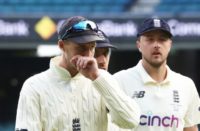When Onions and the boys showed that Northeast spirit…
Continuing our new series, Paul Edwards rewinds only three years to relive the glories of Durham’s Championship winning side in 2013
It is, you might think, a rum sort of archive that delves back all of three years. You would be right: the memories are still fresh, the cuttings have not yellowed and eight of the cricketers who brought the title to Durham in 2013 are still with the club. But if retelling the triumph of Paul Collingwood’s team does not require much historical imagination, the event itself suddenly seems as firmly lodged in the past as the deeds of Compton’s Middlesex or Shackleton’s Hampshire.
As Durham contemplate the prospect of beginning the 2017 season in Division Two, and on minus 48 points for good measure, their third title in six seasons must seem like history indeed. That summer they suffered defeat in two of the first three Division One games, but only lost their fourth, away at Sussex, once the pennant had been secured. When it mattered they reeled off five consecutive victories, with their seven-wicket defeat of Yorkshire at Scarborough in late August proving vital in deciding the destination of the title.
Yet even in that glorious season there had been portents of the problems that cloud Durham’s present. Having breached the ECB’s £1.8m salary cap the previous year, the county had begun the campaign on minus 2.5 points and the 2013 season was characterised to some degree by the release of players and other, more minor acts of cheese-paring. Few pundits expected the team who had been bottom of Division One for much of 2012 to transform their fortunes. But the critics did not know Durham; nor, it could be argued, did they understand the Northeast.
The beating heart of Collingwood’s team remained local and no one epitomised its spirit more clearly than the lithe figure of Graham Onions, arguably the best bowler in the land in 2013. Onions took 70 wickets in his dozen Division One games and those who pointed to the fact that he played half his cricket in bowler-friendly conditions at the Riverside had to reckon with the fact that 32 of those wickets were taken away from home.
Needing only a curving run-up of no great length and possessing a naturally whippy action, Onions is able to hit the seam and move the ball away yet also has a wicked inswinger. In partnership with Chris Rushworth, who took 50 wickets in a season for the first time, the Gateshead-born bowler offered batsmen of even the highest class the toughest test they were likely to encounter in the English game. Onions learned much of his cricket at Gateshead Fell CC, but his enthusiasm for the game led him to practise wherever the opportunity presented itself. His recollections, as told to Tim Wellock for the fine profile written to mark Onions’ selection as one of Wisden’s Five Cricketers of the Year in 2010, evoke a more innocent age.
“I used to play in the street at home,” he said. “We had one neighbour who used to confiscate the tennis balls that went in his garden, but one Christmas he gave me about 30 back. There was a boy about three doors along who used to get migraines, and if he couldn’t come out I’d be devastated. I’d be back at his door two hours later to see if he was better.”
Suddenly it is as if we are in the middle of that famous Hovis advert with a brass band playing the Largo from Dvorák’s New World Symphony. But Onions’ fondness for his roots in the Northeast was shared by many of his team-mates. While Durham’s success in 2013 owed something to the contribution of two African-born players, Michael Richardson and Keaton Jennings, it was also the product of a deeply-ingrained regional pride which has always served the county well.
Phil Mustard, Scott Borthwick and Rushworth all came from Sunderland; Mark Stoneman was born in Newcastle, Mark Wood in Ashington and Collingwood in Shotley Bridge. While Northumberland is a powerful cricketing county containing a clutch of impressive clubs, it remains true that Durham carries a particular responsibility for the game in the Northeast. The same may be said of Somerset in the West Country, as long as enormous respect is shown to cricket in Devon and Cornwall.
Durham’s responsibilities were discharged with signal honour by Collingwood and his team in 2013, a summer which was disrupted and nearly permanently scarred by the cardiac arrest suffered by head coach, Geoff Cook, on June 20. The popular Cook recovered and later returned to the colours, dividing his duties with the-then second team coach, Jon Lewis. Durham’s players proceeded to produce a brand of cricket which might have been prescribed to aid their coach’s recuperation.
“Things just kept happening to test us, and somehow we just kept showing the resolve,” said Collingwood. “I don’t know what it is, or if we can bottle it. It seems to be inside the Northeast people. They just want to fight.
“I feel I have been a sensible captain, I don’t generally make decisions straight off the cuff. If I think a youngster can come in and do a job, I will give him the opportunity. Seeing the youngsters blossom has been absolutely wonderful.”
Three of the youngsters who flourished in that summer, which manages to seem both distant and recent, have since gone on to play Test cricket. Ben Stokes was a raw, brash 22-year-old when he made most of his 615 Championship runs and took 42 wickets in 2013. He contributed 127 and dismissed five Yorkshire batsmen in the vital victory at Scarborough.
Scott Borthwick was promoted to the pivotal No. 3 spot in the order, and made a thumping success of the job, scoring 1,022 runs to add to the 28 wickets he claimed with his leg-spin. Both players made their Test debuts in the following winter’s Ashes series and the fast bowler, Mark Wood, still an exciting work in progress in 2013, was to follow them 18 months later as the county maintained its excellent tradition of producing England cricketers.
There was little doubt that Durham deserved to win the title in 2013. Four of their ten wins were achieved away from Chester-le-Street and the 11-run home victory over Warwickshire in June illustrated the diverse strengths of Collingwood’s team. Onions took seven wickets in the match and Stokes bagged six but Durham’s success owed as much, if not more, to Stoneman’s imperious 83 and Michael Richardson’s fighting 55, both men producing their best performances in the third innings of the game and on a pitch where few batters played with confidence.
Yet even as we recall and salute Durham’s cricket in 2013, the present obtrudes on this most recent of archives. One does not need to be a cynic to note that Borthwick and Stoneman, the two batsmen who made over a 1,000 Championship runs in 2013, will be playing for Surrey next April. Made aware of Durham’s financial problems this summer, they have sought to safeguard their futures. Those who would criticise them need to think whether they would have acted any differently in the circumstances.
The cricketers who remain at Durham face a challenge far greater than those which confronted Collingwood’s team in 2013. Before that season – there was no money available for a pre-season tour – the Shotley Bridge warrior led his squad up Beinn Dubh, a Scottish mountain, in order to develop team spirit. Quite what he plans to do before the 2017 campaign is anybody’s guess.
Durham’s situation this winter casts a cold light on the glorious era in which they won five trophies in eight years. Included in the ragbag of penalties imposed by the ECB in exchange for bailing out the county are points deductions in each of next summer’s competitions. It is these as much as anything which makes it look as though the game’s administrators were scratching around for sticks with which to beat Durham. It is, one supposes, all part of the deterrent.
Few are arguing that the county does not deserve to be punished for financial mismanagement; there have not been too many good arguments against relegation. Yet other factors have played a part in Durham’s current troubles: the ECB’s own insistence that Durham build a Test match ground as a condition of being awarded first-class status; the boneheaded competitive bidding process for such games; and the scheduling of many of Chester-le-Street’s five-day matches for May, when tickets are notoriously difficult to sell.
Set in that broader context, Durham’s problems seem part of more general mismanagement and a consequence of the rather dim idea that England ever needed more Test match venues. As for Collingwood and his players, they will summon up the spirit of 2013; no doubt Onions, Rushworth and their colleagues will give of their best once again.
One of their team-mates, however, may have other things on his mind. Keaton Jennings, who scored 707 runs in 2013, has just been called up to join the England squad in India. He may become the ninth Durham cricketer to grace the Test arena; it is a record which, in recent years, only Yorkshire can better.
This piece originally featured in The Cricket Paper, December 2 2016
Subscribe to the digital edition of The Cricket Paper here















